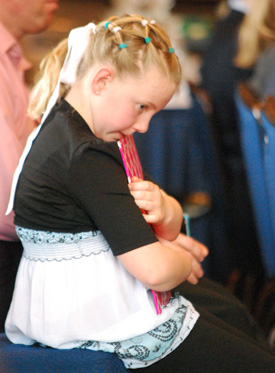UM Students Lobby Regents to Take Action
University of Michigan board of regents meeting (March 15, 2012): About 100 people – most of them students advocating for tuition reform or changes to the University of Michigan’s childcare subsidy – packed this month’s venue for the regents meeting: The Michigan Union’s cavernous Pendleton Room.

Genevieve Urbain awaits her turn to speak during public commentary at the March 15, 2012 UM board of regents meeting. She was one of three people who spoke on the topic of Willis Ward, urging regents to find a way to honor the African-American athlete who played football for UM in the 1930s. (Photos by the writer.)
With minimal discussion, regents dispatched a variety of action items during the meeting, including several related to health education, facilities and athletics. They authorized a $50 million new building for the School of Nursing, as well as $20.5 million in renovations at the Taubman Health Care Center. In athletics-related items, regents approved renaming the Crisler Arena to Crisler Center, reflecting the broader uses there, as it has expanded in recent years. The board also authorized a $2 million increase in the budget for renovations at Yost Ice Arena, bringing that project to $16 million.
Ron Zernicke, dean of the School of Kinesiology, gave the meeting’s only presentation. He described the school’s facilities and academic programs, and the pressures of its increasing student enrollments. For undergraduates, kinesiology is the fourth largest school at UM’s Ann Arbor campus, with 877 students.
As part of her opening remarks, UM president Mary Sue Coleman reported that Fred White – a retired university auditor –has been hired as project manager to implement recommendations from an internal audit. The audit relates to an incident last year involving child pornography allegedly viewed on a UM health system computer. White will also serve as a liaison for an external review ordered by the board at its February meeting.
Several reports were received during the meeting as items of information, including the regular report on internal audits, and a summary of ongoing construction activities. Tim Slottow, UM’s chief financial officer, noted that the Fuller Road Station has been removed from the construction project list. He told regents that the university and city of Ann Arbor couldn’t agree on a memorandum of understanding on the joint project, but that he thinks it’s still a good aspiration. [See Chronicle coverage: "UM, Ann Arbor Halt Fuller Road Project"]
As it did at last month’s meeting, public commentary focused on better access to a childcare subsidy available to parents who are UM students – an issue being negotiated by the Graduate Employees’ Organization (GEO) – and equity for students who are charged out-of-state tuition because they are undocumented immigrants. Students urged regents to support both issues.
The meeting ended with three speakers – including eight-year-old Genevieve Urbain – asking regents to honor Willis Ward, an athlete at UM during the 1930s who faced discrimination because of his race. Regent Martin Taylor, who said Ward had been a friend and fraternity brother, got consensus from regents to seek recommendations on how Ward might be appropriately recognized. [Full Story]




